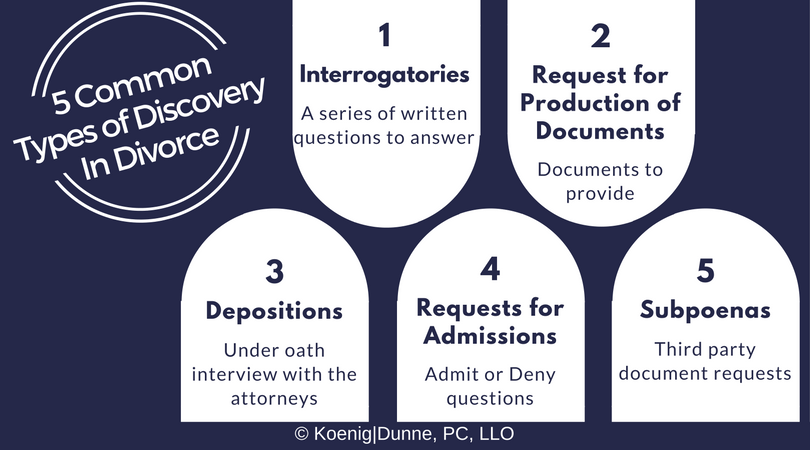During the pendency of your divorce, you and your spouse may gather information needed to resolve your case. This process, known as discovery, is the formal exchange of information. It helps prepare a case for trial, narrow issues in the case, facilitate settlement, or eliminate any surprise at trial. You may receive discovery requests from your spouse (or your spouse’s attorney). You may also send discovery requests for your spouse’s completion.
In discovery requests, parties may request not only relevant information, but also information which may lead to relevant information. You may be required to provide information in your discovery responses that ultimately would not be admissible at trial.
Here are the five common types of discovery that you may encounter during your divorce:
- Interrogatories. Interrogatories are written questions that one spouse sends to the other spouse for completion. The spouse receiving the interrogatories must answer in writing, under oath, signing before a notary.
- Requests for Production of Documents. This type of discovery is a formal request for documents that a spouse believes is needed to have a full picture of the issues of the case. Documents are not limited to paper documents; they can be pictures, voice mails, emails, text messages, and so forth.
- Depositions. Depositions involve the asking and answering of questions, under oath, outside of the courtroom, and in the presence of a court reporter. Click here to read more about depositions in Nebraska.
- Requests for Admissions. Requests for admissions are written statements asking a person to admit or deny a fact. Unlike interrogatories, this method is primarily used for getting to the truth, not for gathering information. When responding, no explanation for admitting or denying the statement is required unless you have no knowledge of the statement or if you are admitting part and denying part of the statement.
- Subpoenas. A subpoena is a court order compelling a third party to produce requested documents. Subpoenas issued in divorce cases are often sent to financial institutions or employers in order to obtain documents directly from the records keepers. To issue a subpoena, a party must provide advance notice to the other party of his or her intention to serve a subpoena on a third party. If there is no objection, the subpoena is issued. Subpoenas can be an efficient way to obtain accurate documentation on a party’s income, benefits, retirement accounts, and bank accounts.
Not all divorce cases will involve extensive, formal discovery. Talk with your experienced family law attorney about the types of discovery needed for your unique circumstances.
Lindsay Belmont

